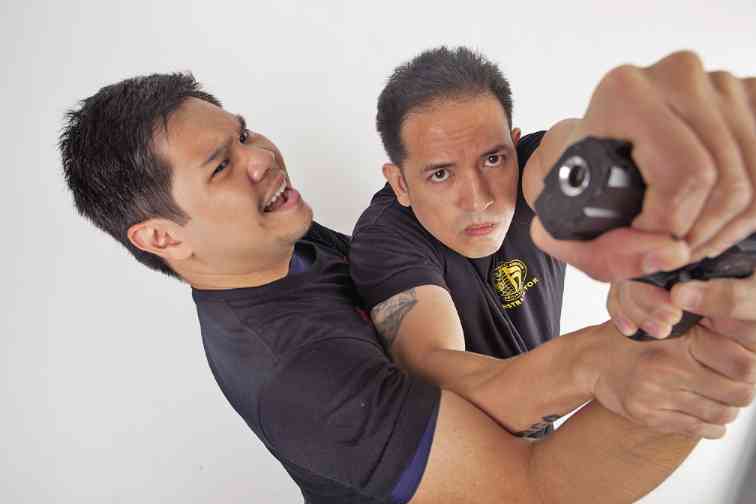Krav Maga means business
Maybe he’s lucky. Or smart. Or maybe both.
Being able to send your kids to good schools, living quite a comfortable life, travelling abroad, and having celebrities as clients may be unusual for someone whose business is to teach people how to defend themselves.
But Eduardo de Jesus has found the right mix of skill and circumstance that made everything work.
De Jesus is the regional director of IKMF Krav Maga and the highest-ranking certified Krav Maga practitioner in Asia, except Israel, where Krav Maga originated.
IKMF, or International Krav Maga Federation, is one of the Krav Maga federations formed by students of its founder, Imi Lichtenfeld.
Krav Maga is a self-defense system that emphasizes practical self-defense. Its founder, Lichtenfeld, and his top students have distilled techniques and principles from boxing, wrestling, Aikido, Jiu-jitsu, and other martial arts to come up with easy-to-learn and effective techniques against any attack.
De Jesus says it’s so easy and effective that celebrities have taken lessons from him. Consider his list of clients: KC Concepcion, Julius Babao, Tintin Bersola, Julia Barreto, Liezl Martinez and her kids, Isabel Roces, Alden Richards, and Karen Gimeno.
Word-of-mouth works
Did he put out some catchy and clever advertisements to get these clients? Not at all. Word-of-mouth through the internet and social media did the job for him.
There are of course the traditional martial arts such as karate, taekwondo, and mixed martial arts, or MMA, but, says de Jesus, these are more like sports because there are rules to follow. There are no rules in Krav Maga.
Real attacks, scenarios
“People now want something or a system that deals with real attacks, real scenarios. They say, ‘If I will be investing time, money, and I don’t want to join competitions and I’m not that flexible, and not that young or have a big body, and I don’t really exercise that much, Krav Maga is the one for me,” says de Jesus.
De Jesus did not go into Krav Maga immediately.
After getting his degree in business administration from the University of Sto. Tomas, he worked for Chinabank for seven years.
He also dabbled in business, being one of the pioneers of the laundry business.
His business lasted 12 years and de Jesus had three branches when he sold it.
Kicks and punches
At that time, he was also into recreational bodybuilding, which explains his well-defined muscles.
But in 2008, he got a taste of Krav Maga and never looked back.
He tried traditional martial arts but got bored with the endless kicking and punching. He even tried aikido, but, after getting thrown and having to learn how to do front rolls, he had enough.
Now that he’s into Krav Maga, he still gets to kick and punch, and even applies aikido techniques adapted for Krav Maga. Only after a year since he started training, in 2009, he finished his instructor’s course and got his certification.
“In my first lesson, we already had sparring. I told myself this is the real thing. I saw that they really were dealing with real attacks,” says de Jesus, who has since trained his way to Expert Level 2 in Krav Maga.
Teaching the clueless
Today, he doesn’t just teach celebrities who found him through the internet and social media. He teaches employees and security personnel of companies and government agencies, spreading his knowledge and expertise to the clueless.
Being the regional director of IKMF Krav Maga, he has visited countries in Asia such as Korea and Mongolia just to hold certification exams and oversee the IKMF organization in those countries.
He now offers Krav Maga in three gyms in Metro Manila. In the provinces, there are two gyms in Cebu, one in Cagayan, and four in Davao. He visits these gyms regularly and he has 16 certified instructors nationwide.
Just like going to the gym
The cost is similar to regular gym memberships and other exercise regimens. For 12 sessions a month, you pay P4,000, 8 sessions a month cost P3,500, and for those who could only attend once a week, or four sessions a month, that’s P2,000. For the fanatics, they can have unlimited sessions for four months for only P10,000, and P9,000 for three months.
Despite the growing popularity of Krav Maga, there are challenges, too. One is the availability of gyms willing to open their doors to Krav Maga. Renting a place can be expensive. Some gyms, particularly the big ones, are not that open to martial arts and self-defense, thinking themselves purists, according to de Jesus. Some gyms also don’t have the right specifications in terms of size and ambience—no music allowed.
Adaptive Krav Maga
Another challenge is getting students. Because it can be physical and may tax the body and even cause some pain, some are discouraged or intimidated. Fortunately, there is such a thing as adaptive Krav Maga. Senior citizens, children, people with missing limbs can still practice Krav Maga despite their limitations.
Another challenge is the availability of certified instructors. De Jesus says training can be expensive because he has to bring in a person from Israel just to train them. For the instructor’s course, the early bird price is 2,500 euros, or around P135,000. Quality, however, is guaranteed.
Despite the success that he has reached, de Jesus says this business may not be for everybody.
“It’s like becoming a priest or perhaps a doctor. You want to give something to the people and when you become an instructor, you don’t think about income. The income is a bonus. It should be a passion, everything else will follow,” says de Jesus.

